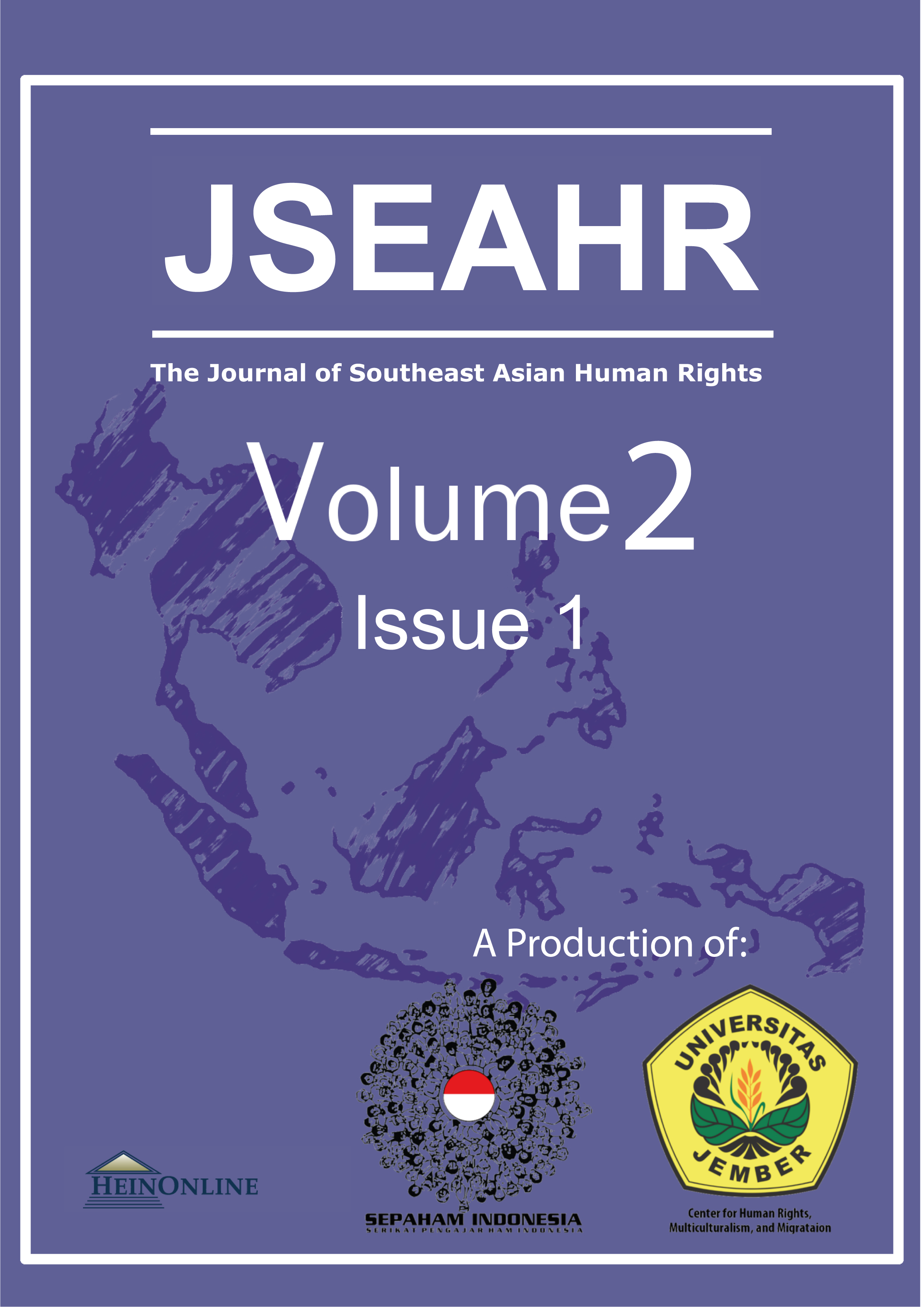When Human Rights are not Enough
A “Failure†of Multiculturalism in Indonesia? (A Preliminary Hypothesis)
DOI:
https://doi.org/10.19184/jseahr.v2i1.5332Keywords:
Multiculturalism, Interculturalism, Human Rights, IndonesiaAbstract
Juridically, there have been quite a lot of legal instruments existing in Indonesia to protect human rights. These legal instruments include the Indonesian Constitution, which has special articles regulating about human rights, the Human Rights Act (the Law Number 39 of 1999), the National Commission for Human Rights, etc. Thus, normatively, all those legal instruments should be adequate to protect human rights in Indonesia, including the protection of the minority groups. However, the facts don’t seem in line with such expectation. There have been a lot of cases happened in Indonesia that bring this country into a serious question in its ability to protect the minority groups. The persecutions over the Ahmadiyah and Shia sects, the rejections against non-Muslim worship place establishments, and as the most recent one, the case of Jakarta’s governor Basuki Tjahaja Purnama, are some of the long sad stories showing how Indonesia is really poor in its performance to protect the minority groups. Identity politics and even a sentiment of racism are re-escalating in Indonesia today, which seems affirming the research findings got by the Wahid Foundation showing that 59.9% of 1520 of respondents from 34 provinces in Indonesia said that they have hatred towards some groups of their fellow citizen, such as those who are non-Muslims, Chinese-descents, communists, etc (Hakim 2016). Among this 59,9% respondents, 92,2% of them said that they highly oppose a person coming from those groups to become a governmental leader, and 82,4% of this people even said that they don’t want to have a neighbor coming from those groups (Hakim 2016). Such re-emergence of identity politics and sentiment of racism, as well as a frightening fact of hatred among people, really give a serious question about why all the human rights instruments which already exist in Indonesia seem to fail in preventing all those things to happen. In this article, I will show my hypothesis that all that sad news that happened in Indonesia in regard to the minority group protection are due to the failure of multiculturalism approach implemented in Indonesia so far. Thus, I will also propose the interculturalism approach to be implemented in Indonesia as the critique and refinement of multiculturalism approach in dealing with the multicultural society, including in regard to the minority groups protection.
Downloads
References
Azra, Azyumardi. “Revisitasi Islam Politik dan Islam Kultural di Indonesia†(2012) 1:2 J INDO-Islam 233.
Cantle, T. Interculturalism: The New Era of Cohesion and Diversity (Springer, 2012).
Consorti, P. “Multiculturalist Conflict and Intercultural Lawâ€.
Emont, Jon. “As Shariah Experiment Becomes a Model, Indonesia’s Secular Face Slipsâ€, N Y Times (20 January 2018), online: <https://www.nytimes.com/2017/01/12/world/asia/indonesia-sharia-law-aceh.html>.
Emont, Jon. “2 Men in Indonesia Sentenced to Caning for Having Gay Sexâ€, N Y Times (22 December 2017), online: <https://www.nytimes.com/2017/05/17/world/asia/indonesia-gay-caning.html>.
Hakim, Rakhmat Nur. “Survei Wahid Foundation: Indonesia Masih Rawan Intoleransi dan Radikalisme Halaman 1â€, (1 August 2016), online: KOMPAS.com <https://nasional.kompas.com/read/2016/08/01/13363111/survei.wahid.foundation.indonesia.masih.rawan.intoleransi.dan.radikalisme>.
Hariyadi, Mathias. “Bekasi, anti-Christian persecution continues. A Protestant church targetedâ€, online: <http://www.asianews.it/news-en/Bekasi,-anti-Christian-persecution-continues.-A-Protestant-church-targeted-17563.html>.
Kymlicka, Will. Multicultural Citizenship: A Liberal Theory of Minority Rights (Clarendon Press, 1995).
Legge, J D. “Indonesia - The Ethical Policyâ€, online: Encycl Br <https://www.britannica.com/place/Indonesia>.
Meer, Nasar & Tariq Modood. “How does Interculturalism Contrast with Multiculturalism?†(2012) 33:2 J Intercult Stud 175.
Modood, NM. “How does Interculturalism Contrast with Multiculturalism?†(2011) J Intercult Stud.
Muhtada, Dani. “Perda Syariah di Indonesia: Penyebaran, Problem dan Tantangannyaâ€, online: <http://www.academia.edu/11761775/Perda_Syariah_di_Indonesia_Penyebaran_Problem_dan_Tantangannya>.
Subdirektorat Statistik Politik dan Keamanan. Statistik Politik 2016 (Jakarta, Indonesia: Badan Pusat Statistik, 2016).
Suparlan, Parsudi. “Masyarakat Majemuk, Masyarakat Multikulturalâ€, online: Interseksi Found <http://interseksi.org/archive/publications/essays/articles/masyarakat_majemuk.html>.
The Jakarta Post. “Police fire tear gas at Bekasi church protestorsâ€, online: Jkt Post <http://www.thejakartapost.com/news/2017/03/24/police-fire-tear-gas-at-bekasi-church-protestors.html>.







